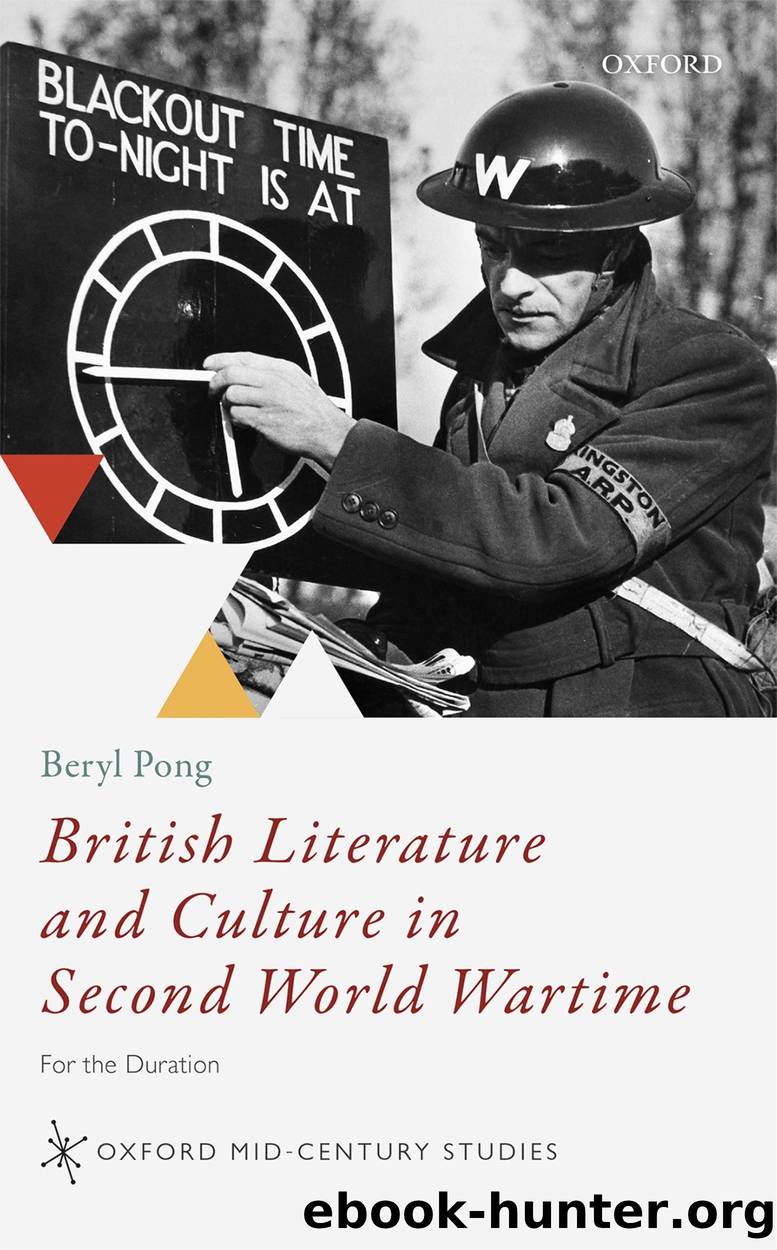British Literature and Culture in Second World Wartime by Beryl Pong

Author:Beryl Pong [Pong, Beryl]
Language: eng
Format: epub
Publisher: Oxford University Press
Published: 2020-05-10T00:00:00+00:00
âWe must return to having children. If we are to have a future as noble as our pastâ
A decade before writing Cloudless May, in her autobiographical work No Time Like the Present (1933) Jameson expressed anger at the First World War and discouraged her son from engaging in any future conflict: âI shall tell him ⦠that war is not worth its cost, nor is victory worth the costâ (238). By the Second World War, while no less a pacifist and no less opposed to war, Jameson felt that something had to be done to end the occupation of a country she held dear. But her treatment of children, and of warâs impacts on children in particular, remain one of the most ambivalent aspects of the novel. For Rienne as for others, the propensity for mythologizing Franceâs temporal resilience and eternalityââOn the Loire or on the Garonne or on the Dordogne or on the Lot, they would defend the Seine, they would defend a memory and the futureââhinges on the idea of protecting children as the means for national posterity (471). As the fascist collaborator Thiviers declares: âWe must return to having children. If we are to have a future as noble as our pastâ (258). Children are repeatedly invoked with ideological intentions by all sides in the debate over the national future. Even Margueriteâs private wish to escape poverty and the war is couched in her desire to bear a son with Bergeot; she uses the promise of pregnancy as a shorthand for the possibilities of a post-armistice future.
The intersection of roots and futurity with that of children would find its most negative and egregious foil in Labenne, who, obsessed with heritage and lineage, wants his children, and his childrenâs children, to carry on the legacy of fascism through the generations. His concern for his offspring is linked less to their well-being than to their role in guaranteeing his posterity: âHis son was more than a fine boy. Henry was his stock, his roots in the ground of a province, his future. The future of France, the safety of France, was the same thing as Henryâs safety, the safety of the virile Labenne stockâ (248). Later again, â[H]e talked about the future of France as if France equalled Labenne. He bragged about his great grand-childrenâ (407). As he imagines their future marriages, professions, and political influencesââof the two sons the younger might go into the Churchâwhy not?âthe Church is still a power ⦠.âLabenne father of Cardinal Labenneââthe children are not children at all, but merely conduits for his political machinations and legacy (338). Labenne also ties them intimately to the French landscape, especially to his house in Thouédun, which suggests some uneasy affinities with Bergeotâs and Ãmileâs idealizing of place in their respective understandings of national time.
The only moment in which the novel explicitly undercuts the ideological abstraction of children is in the scene of the exodus, as Katherine Cooper points out (âHis Dearestâ). During those few weeks,
Download
This site does not store any files on its server. We only index and link to content provided by other sites. Please contact the content providers to delete copyright contents if any and email us, we'll remove relevant links or contents immediately.
Love Your Life by Sophie Kinsella(1265)
Albion by Peter Ackroyd(1065)
The Hell of it All by Charlie Brooker(896)
How To Be A Woman by Caitlin Moran(865)
All in a Don's Day by Mary Beard(846)
Albion: The Origins of the English Imagination by Peter Ackroyd(828)
A Dictionary of Literary Symbols by Michael Ferber(797)
The Eye in the Triangle: An Interpretation of Aleister Crowley by Israel Regardie(762)
Protector by Conn Iggulden(759)
Dot Con by James Veitch(740)
English Literature: A Very Short Introduction by Jonathan Bate(711)
Less: Winner of the Pulitzer Prize for Fiction 2018 by Andrew Sean Greer(648)
English Literature: A Very Short Introduction (Very Short Introductions) by Bate Jonathan(599)
I, Partridge by Alan Partridge(585)
The Songbook of Benny Lament by Amy Harmon(582)
Katharine Parr, the Sixth Wife by Alison Weir(557)
Mussolini: His Part in My Downfall by Spike Milligan(547)
Work! Consume! Die! by Boyle Frankie(544)
The Cambridge Introduction to Jane Austen (Cambridge Introductions to Literature) by Janet Todd(538)
